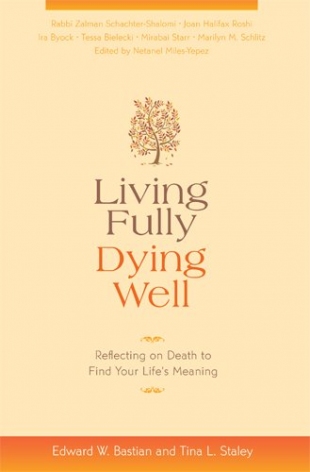Edward Bastian was executive producer for six award-winning BBC and PBS programs about religion and three films about Tibetan Buddhism for the National Endowment of the Humanities. He was a teacher and program director at the Smithsonian Institution. He is currently president of the Spiritual Paths Foundation which offers weekend retreats and a two-year certificate program about InterSpiritual Wisdom. Tina Staley is director of Pathfinders at Duke University Comprehensive Cancer Center. She co-founded the Pathfinder program in Aspen, Colorado, for empowering cancer patients and their families to rediscover their inner strengths and take back their lives.
This sturdy and enlightening work is based on a seminar called Living Fully: Preparing for the End of Life and Beyond which was held over a weekend in July 2004 in Aspen, Colorado, and featured Rabbi Zalman Schachter-Shalomi, a Hasidic rebbe and founder of the Jewish Renewal and Spiritual Eldering movements; Joan Halifax Roshi, a Zen abbess who is an expert on care for the dying and Shamanism; Mother Tessa Bilecki, co-founder of the Spiritual Life Institute and a Carmelite Christian abbess; Dr. Ira Byock, bestselling author and one of the world's foremost authorities on palliative care; Dr. Marilyn Schlitz, vice president for Research and Education at the Institute of Noetic Sciences; and William Cathers, a student of Mortimer Adler and a public philosopher. This seminar had special relevance to Bastian who writes in the introduction about his two close encounters with death due to a bee sting and a pulmonary embolism. The teachings in this book show how "the integration of medicine, spirituality, philosophy, and science can lead to a positive, fulfilling, and transformative end-of-life experience."
Living Fully Dying Well covers a broad range of subjects including coming to terms with our mortality, the value of little deaths as training exercises, the ways in which our conventional health-care facilities approach death, ideas on enhancing the quality of life for the person who is dying, the teachings that death and dying have to offer us, insights of the wisdom traditions on the afterlife, and the current scientific research on nonlocal consciousness and the afterlife.
Our favorite section of the book is the last one on resources. It presents life review exercises, strategies for facing our mortality, ways to heal emotional wounds and give ourselves the gift of forgiveness, practices for transforming pain and suffering, meditations and preparations for the moment of death, practices for caregiver and the bereaved, visualizations for emotional healing, and ministering to the bereaved. Here is an example of a practice by Joan Halifax which she calls "Transforming Pain with Affirmations of Compassion":
"May my suffering show me the way to compassion.
May I freely receive others' love and compassion.
May I experience my pain with compassion.
May I be open to feel my pain.
May I be free from suffering.
May I connect with all those who have pain like I am experiencing;
although I am in pain, so are many others.
May those with pain like mine be free of their suffering."
In the same style, Halifax offers "Transforming Pain with Affirmations of Equanimity":
"May I observe my pain with equanimity.
May I be present for my pain and suffering.
May I accept things as they are.
May I have the strength to face my situation.
May I accept my pain, knowing that I am not my pain, not my body,
not my illness.
Even though I am in pain, may I handle it.
May I realize that this pain is not permanent.
May I be aware of my pain, knowing that I am not my pain."
